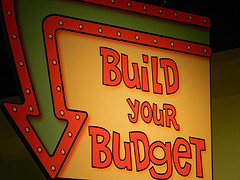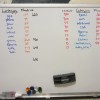Poll: Budgets Are a Tool, After All – How Do You Use Yours?

I would say our budget is a combination of a spending outline and category maximums. Many of our categories are fixed or very stable month-to-month so that’s more spending outline. Our discretionary categories are for the most part maximums. I’ve never been much good at denying myself in the grocery store so I don’t really follow through on strict directives with lower limits – we try to set our budget limit well higher than our average but there are some months, like October, where we exceed it anyway. We also try to keep around $15-30 unaccounted for in our budget because small unexpected things always come up. Finally, there are certainly months when we are traveling frequently (like this past September) when the budget is pretty irrelevant!
We got cost-of-living raises in September and we haven’t yet re-adjusted our budget, and it feels nice that I can usually expect a little money left over at the end of the month. I’ve started zeroing out our checking account – that is, any money that comes in as income in a given month that isn’t spent or auto-saved is transferred to one of our savings accounts. We are planning a big vacation for January 2012 and we need all the available dollars in our Travel savings account!
What method do you use for budgeting? How do you handle deficits or excesses at the end of the month?
photo by eric731
Update: Sorry everyone, the original poll results were deleted! Feel free to continue voting, though.
Filed under: budgeting, participation

 How Often Do You Adjust Your Budget?
How Often Do You Adjust Your Budget? The Dollar Challenge
The Dollar Challenge Welcome, Budgets Are Sexy Readers!
Welcome, Budgets Are Sexy Readers! Consistent Grocery Budget Fail
Consistent Grocery Budget Fail


I’m so bad at budgeting. That’s why automatic deductions from my paycheck are a lifesaver. We try to save a bunch into our retirement funds, and I save a little bit for short-term goals, but the rest kind of just disappear even though we try to track those expenses.
I love automatic savings deductions as well. I don’t have any through my employer aside from taxes so I have a bunch set up on my own. I’d say your non-budget is a success though since you have evaluated your income and spending enough to set up savings goals and (I presume) aren’t running a deficit.
I’m not sure if what I do is budgeting or something else… and I’m still not sure it’s how I want to do things, but it’s how I handle finances now: We spend what we feel is appropriate (we both are very frugal, and were so before marrying; our perceived needs and wants and means to purchase them line up), and then I go back with receipts and bank statements to see what our spending habits are. From there, based on anticipated spending behavior, we make decisions about savings, and travel. Not very controlled or meticulous, but it’s worked for us so far. This may change as we add/refine financial goals (increase emergency fund amount, student loan payback, etc.) and in the future when we may no longer enjoy the low cost of living we have now.
Yeah, I guess I wouldn’t call what you do budgeting either – I think it has to be prospective. I don’t know that we necessarily need to track and budget as strictly as we do, especially now that we have a lot of things on autopilot. But it was very helpful for a few decisions we had to make right after we got married/moved in/combined finances:
1) how aggressively to save for my student loan debt repayment
2) whether or not we could afford to keep cable
3) how we would save for certain medical expenses (i.e. I no longer had dental or vision coverage since I got kicked off my parents’ insurance and had to switch to my university’s)
I think we found that our tight budgeting has actually allowed us to be more generous with ourselves with less arguing/worrying over those decisions. I’m specifically thinking of our CSA subscription, our season tickets to the Broadway series at our local theater, and our electronics purchases.
Even if we decided we didn’t need to track anymore I still would because using Mint is so easy and not at all time consuming. Do you use any tracking software? (Not that I think you need it, but it’s a good resource to be aware of.)
I do exactly the same thing as Heather describes. I’m usually very conservative when spending, though not to the point of clipping coupons, so I buy what I think is appropriate for my needs. Every few months I download my debit card transactions to Quicken and organize purchases by category. I can then see what my “business as usual” spending is over several months, as well as how much surplus I have. With automatic transfers I move to my savings account roughly my monthly surplus. The overall effect is that on a month-to-month basis my checking account should stay constant, and overspending is evident when this is not the case. So far this also works on a yearly level; I can see if my year-over-year savings decreases due to travel, etc.
I would agree that this is not a budget, however, since it is applied after the fact. On the few attempts to curb my food spending (groceries+dining) I’ve yet to make a significant savings. More significantly, most of my major purchases result from tons research/reviews in addition to putting off purchasing for several months on the premise of “saving up”. This process drags out the anticipation (reducing buyers remorse) and prevents me from making frivolous purchases.
We’ve managed to cut our eating-out budget category from about $150/mo to $60/mo but haven’t found as much room in our groceries category. I totally agree that holding off on major purchases has benefits beyond being able to save up. Kyle does the bulk of the product-researching on behalf of our family and he is great at it. It definitely saves money to buy the best product you can afford that you know you’ll like and use rather than the first thing that catches your eye.
Forgot to say: because I get paid pre-tax just a few times a year, I do these detailed reviews of our finances in chunks, once every few months, so I know how much of those installments I should put into short-term vs long-term savings.
[…] – we don’t always tell ourselves no when the numbers say we should – and there are lots of different interpretations of how to budget. I can see how it might be possible to live without a budget, if we 1) were meeting all of our […]